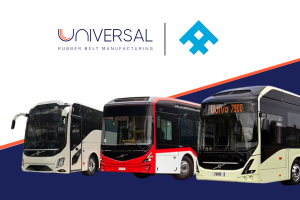Africa is experiencing one of the fastest industrial growth rates in the world. With rapid urbanization, infrastructure development, and a young workforce, the continent is becoming a hub of opportunity for manufacturers and suppliers alike. Among the essential components driving this transformation are industrial belts—the backbone of power transmission, automotive performance, and machinery efficiency. In this article, we will explore the growing demand for industrial belts in Africa, the industries driving this need, the challenges and opportunities for global suppliers, and why the continent represents one of the most promising markets for the future.
What Are Industrial Belts and Why Are They Important?
Industrial belts are flexible loops made from rubber, synthetic compounds, or polymers, used to transmit power between rotating shafts. Common types include:
- Timing Belts – for precision applications in automotive engines and industrial machinery.
- V-Belts – for general power transmission in pumps, compressors, and fans.
- Poly V (Multi-Ribbed) Belts – for compact systems requiring higher torque.
- Conveyor Belts – for transporting goods in mining, agriculture, and manufacturing.
Their role is critical because they:
- Improve efficiency and reduce energy losses.
- Require minimal maintenance compared to chains/gears.
- Enable smooth, quiet, and reliable operations.
In Africa, where industries are scaling quickly, reliable belt systems are vital for minimizing downtime and maximizing productivity.
The African Market Landscape
Industrial Growth
- Africa’s manufacturing sector is expected to reach US$1 trillion by 2030 (McKinsey).
- Countries like Nigeria, South Africa, Kenya, and Egypt are investing heavily in industrialization.
- Automotive assembly plants, mining operations, and agriculture mechanization are fueling demand for belts.
Infrastructure Development
- New railways, airports, and energy projects across Ethiopia, Ghana, and Morocco require conveyor and transmission belts.
- Africa’s infrastructure investment is estimated at US$130–170 billion annually.
Automotive Expansion
- Africa’s vehicle market is projected to grow from 1 million to 5 million annual sales by 2035.
- Assembly hubs in Morocco and South Africa rely on timing and serpentine belts for production.
👉 These trends make industrial belts in Africa a fast-growing market segment.
Key Industries Driving Belt Demand
1. Automotive Industry
- Assembly plants in South Africa, Morocco, and Nigeria require timing and V-belts.
- Growing aftermarket demand for spare parts supports replacement belts.
- Belt reliability directly impacts engine life and customer satisfaction.
2. Mining & Quarrying
- Africa holds 30% of the world’s mineral reserves.
- Conveyor belts are critical for transporting coal, gold, diamonds, and copper.
- Heavy-duty, abrasion-resistant belts dominate this segment.
3. Agriculture & Food Processing
- Mechanized farming requires belts for tractors, harvesters, and irrigation pumps.
- Food processing plants use conveyor and timing belts for packaging and bottling.
4. Energy & Power Generation
- Gas turbines, wind energy, and hydro plants rely on belts for auxiliary machinery.
- Expansion of renewable energy projects is increasing belt usage.
5. Manufacturing & Industrial Plants
- Cement, textiles, steel, and packaging sectors all depend on belts.
- Growing domestic industries in Ethiopia, Kenya, and Ghana are expanding the market.
Opportunities for Suppliers and Manufacturers
Rising Demand for Local Sourcing
- Import dependency creates delays and high costs.
- Local and regional suppliers can reduce lead times.
- Dubai-based manufacturing hubs (like Universal Rubber Belt Manufacturing) provide a strategic advantage.
African Continental Free Trade Area (AfCFTA)
- Creates the world’s largest free trade area with 1.3 billion people.
- Reduces tariffs and encourages cross-border trade.
- Boosts demand for standardized, high-quality belts across markets.
Growing Aftermarket Sector
- Africa has a young but growing aftermarket industry.
- Spare parts distribution networks are expanding.
- Belts are high-turnover items, making them a reliable revenue stream.
Sustainability & Green Tech
- Renewable energy projects and eco-friendly machinery need durable, efficient belts.
- Manufacturers offering longer lifespan products will stand out.
Challenges to Address
- Counterfeit products flooding markets.
- Lack of awareness about preventive maintenance.
- Harsh operating conditions requiring heat- and oil-resistant belts.
- Supply chain disruptions and high import costs.
Suppliers who provide education, reliable warranties, and technical support can overcome these challenges.
Why Dubai Is a Strategic Hub for African Markets
Dubai offers a geographical and logistical advantage:
- Proximity: Only a few hours away from major African cities.
- 24/7 operations: Shorter lead times compared to Europe or Asia.
- Cost efficiency: Reduced shipping and warehousing costs.
- GCC partnerships: Strong trade relations with African nations.
For African buyers, sourcing belts from Dubai means faster delivery, lower costs, and assured quality.
The Role of Universal Rubber Belt Manufacturing
As a leading belt manufacturer in Dubai, Universal Rubber Belt Manufacturing (URBM) is strategically positioned to serve Africa:
- High-quality power transmission belts for automotive, mining, and industrial use.
- Rapid delivery to African distributors thanks to regional logistics.
- Custom solutions designed for Africa’s climate and heavy-duty needs.
- Partnerships with IAMAGA & Nexus Automotive strengthen distribution networks.
With its advanced facility and around-the-clock operations, URBM is prepared to meet Africa’s rising belt demand.
Future Outlook: The Next Decade of Belt Demand in Africa
- Industrial belts will grow at a CAGR of 6–8% across Africa.
- Nigeria, Kenya, South Africa, and Morocco will lead demand.
- Automotive aftermarket expansion will double belt requirements.
- Local distributors will seek trusted international brands for partnerships.
- Focus will shift to durable, energy-efficient belts for sustainability.
Conclusion: Africa’s Belt Market – A Journey of Growth
The demand for industrial belts in Africa is only beginning to unfold. With its growing industries, infrastructure projects, and automotive expansion, the continent represents a land of opportunities for manufacturers and suppliers.
By combining quality manufacturing, strong distribution networks, and strategic proximity, companies like Universal Rubber Belt Manufacturing are well-positioned to lead this market transformation.
Africa is not just a future opportunity—it is a market that is growing today.





